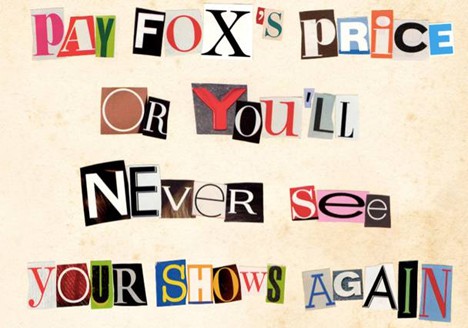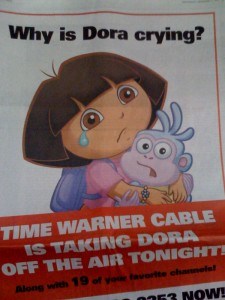
Dick Armey, head of FreedomWorks, a notorious industry-backed astroturf group, was a big proponent of Wisconsin's "statewide video franchise" bill pushed by AT&T
Wisconsin residents, in 2007 you were promised more competition, lower prices, and better service from your pay television and broadband provider. Two years later, two things are certain:
- The Wisconsin Video Competition Act was didn’t exactly deliver what was promised to consumers by those pushing the legislation, but paid off handsomely for the one company lobbying the hardest for its passage — AT&T.
- You had a lower bill in 2007 than you now have in 2009.
A new audit released by the Wisconsin Legislative Audit Bureau exposes the truth AT&T’s astroturfing friends never wanted you to know: despite the passage of a new law in December 2007 that promised increased competition and lower rates, the average basic cable rate in Wisconsin actually increased an average of 21 percent over the past two years.
The Bureau analyzed ten providers’ monthly charges for basic and expanded basic service in 17 Wisconsin municipalities at two points in time—July 2007 and July 2009—using data reported to us by the providers. Over this two-year period, charges for basic service increased an average of 21.2 percent, and charges for expanded basic service increased an average of 11.5 percent. The reported data do not suggest that competition has had a substantial effect in reducing either basic or expanded basic video service charges or in slowing their rates of growth during the period we reviewed.
Wisconsin consumers were promised something very different. So just how did Wisconsin get snookered into passing legislation that was supposed to help consumers, but in reality just helped AT&T?
Dick Armey, chairman of FreedomWorks, an industry-backed astroturf group that heavily promoted the bill, emphatically promised the Competition Act would bring prices down. On November 19, 2007 Armey wrote:
The Wisconsin Video Competition Act would allow consumers to take advantage of new technologies by streamlining the franchise application process for potential providers. When companies compete to provide service, consumers win through more choices, lower prices and better service.
Unfortunately for consumers, the Video Competition Act was little more than a custom-written giveaway to AT&T. From the bill’s earliest draft language crafted by lobbyists working with legislative aides, to the big budget sales job employing 15 lobbyists and a major media budget, AT&T ran the show from start to finish according to Madison’s Capital Times newspaper.

TV4US counts AT&T among its corporate sponsors
TV4US (also known as WeWantChoice.com), an AT&T-supported astroturf group, ran television ads around Wisconsin promoting the bill. In May 2007 the group sent every state legislator binders filled with what it claimed were the names of their constituents who wanted “an end to the cable monopoly” and competitive choice. As The Center for Media & Democracy discovered, several people named, including two state lawmakers, didn’t support the bill and hadn’t given permission for their names to be included.
[flv]http://www.phillipdampier.com/video/TV4US Ad Wisconsin.mp4[/flv]
TV4US ran this ad across Wisconsin in 2007, promoting “cable competition.”
TV4US’ primary press contact Lizanne Sadlier just also happened to be employed by lobbying firm Fleishman-Hillard, which “has built its reputation by using strategic communications to deliver what its clients value most: meaningful, positive, and measurable impact on the performance of their organizations,” according to a press release from the group.
Fleishman-Hillard and AT&T are well acquainted with each other. In fact, the PR firm was instrumental in rebranding the phone company as “the new AT&T” after the SBC-AT&T merger. To this day, AT&T has several company bloggers actually employed by Fleishman-Hillard.
In March of 2007, the Wisconsin Merchants Federation turned up at a state hearing about the Competition Act. This struck several observers as odd, considering the WMF primarily concerns itself with retail store tax policies and strengthening retail theft laws. The WMF seemed well-prepared to articulate the proposed law’s benefits, which included, according to them:
- increased competition in the video entertainment business;
- creation of good-paying jobs;
- bring (literally) hundreds of millions of dollars in capital investment to our state.
PR Watch wanted to know exactly what prompted the WMF to not only testify about a non-issue for retail stores, but also who wanted the group to get involved, and who exactly belongs to the WMF.
WMF’s David Storey told PR Watch that his group sees AB 207 / SB 107 as an economic development issue. “Where consumers have choices, not only are the consumers served, but the economy in general is served. The economy is made stronger,” he explained. “And this is all about consumer choice in the video entertainment field.”
Storey said that no particular member had asked WMF to support AB 207 / SB 107, but that he was personally interested in the issue, as the former Deputy Secretary of the Wisconsin Department of Commerce. Asked for a list of WMF members, Storey responded that one was not available, but that information would hopefully be added to the WMF website in the future.
One thing that is clear is that many of WMF’s partners in lobbying for AB 207 / SB 107 have ties to the telecom industry. The Coalition of Wisconsin Aging Groups, which is a member of the Wisconsin Video Choice Coalition, has received funding from AT&T and from SBC Wisconsin, which is now part of AT&T. The group also offers “discounts on assistive devices for the telephone such as volume amplifiers from the AT&T Special Needs Center.” Another Wisconsin Video Choice Coalition member, the Wisconsin Technology Council, lists AT&T among its major sponsors. Fellow coalition member Women Impacting Public Policy is a Washington DC based group that receives funding from AT&T and Verizon, among other corporate sponsors.
[flv]http://www.phillipdampier.com/video/Press event promoting Wisconsin bill Aug 2007.flv[/flv]
In August 2007, WMF turned up at a press event with other bill supporters to promote the results of a poll conducted by the Mellman Group, which isn’t a respected polling firm but rather a Washington, DC public relations firm that “develops effective communications strategies that lead people to choose our client’s product or service, join their organization, hold their opinion, or vote as we would like.” [1] (13 minutes, video begins at ten second mark)
In short, no matter where consumers turned during the push for the Wisconsin Video Competition Act, that big AT&T logo was always somewhere in sight.
Before the legislation was passed, some were warning Wisconsin the dog and pony astroturf show wasn’t actually working for the best interests of Wisconsin consumers, but were instead looking out for the best interests of AT&T. Charles Uphoff is chair of the Fitchburg Broadband Telecommunications Commission, and wrote this back in 2007:
Lobbyists for telecommunications giant AT&T have been pressuring Wisconsin legislators to pass sweeping changes in the laws regulating cable TV with a million-dollar media campaign and behind the scenes arm-twisting that would make Karl Rove blush.
Under the guise of promoting increased consumer choice, lower cable rates and high-paying union jobs, AT&T is trying to steamroller bills that would prohibit any meaningful regulation of video service rates; eliminate funding for public access, educational and government channels; and effectively guarantee statewide franchises for the telecom giant in perpetuity.
Among the more astonishing features of this dubious legislation is a provision that specifically prohibits the state or local municipalities from reviewing franchise transfers. While initial applicants would have to establish their legal, financial and technical qualifications to obtain a statewide franchise, once granted, statewide franchises can be literally transferred to anyone — even politicians. Video franchise holders wouldn’t even have to inform the affected communities until 10 days after the transfer had been completed.
[…]
So how about the claim being made in the TV ads that cable rates have gone up 246 percent and the “Video Competition Act” would increase choice and save consumer millions? It sure sounds good, but these assertions are, at best, misleading. In the city of Fitchburg, for example, the basic cable rate has risen less than 6 percent over the past 10 years and is currently at $8.19 a month. Admittedly, premium packages have risen much more sharply, largely driven by the cost of content providers like the NFL Network, MTV and ESPN, but AT&T would be facing the same kind of costs if they want to include these offerings.
So if you are expecting whopping decreases in your cable TV bills if this legislation passes, don’t hold your breath. In fact, the ability of municipalities or the state to even regulate basic cable rates would be gone.
What’s happening in Wisconsin isn’t an isolated incident. Wholesale deregulation of the video services industry under the guise of fostering competition is being pushed in legislatures all across the country, backed by big money and conservative ideologues like former House Majority Leader Dick Armey, a Texas Republican whose right-wing “think-tank” has been pushing this legislation since before it had a bill number. Weeks before most members of the Wisconsin Legislature had even seen the bill, Armey’s Freedom Works Foundation was trying to line up sponsors. Major contributors to Dick Armey’s cause include AT&T, Verizon and Exxon-Mobile.
Sadly, the recent trend in video services and telecommunications has been toward increasing the concentration of ownership and control of the media, resulting in fewer consumer choices and less competition, not only in terms of price, but also in terms of ideas. The opinions expressed here are strictly my own, but it seems to me that in the arena where competition is most important to our democracy and our future, the competition of ideas, the net effect of these bills will be to decrease competition through the elimination of public access as a vehicle for information, dialogue and discussion of things that matter to our communities.
Despite playing fast and loose with the facts, the astroturf groups, aided by AT&T’s generous campaign contributions to Wisconsin state legislators helped grease the way towards passage of the Video Competition Act, which was signed into law in December 2007.
But rate increases for consumers aren’t the only problem impacting Wisconsin residents. Collateral damage for those interested in public affairs television programming is now also becoming apparent.
One of the biggest opponents of the statewide video franchising law has been the Wisconsin Association of PEG Channels (WAPC). “PEG” stands for public access, educational, and government access channels found on virtually every cable system in the country. These non-profit channels are provided in the public interest to give subscribers access to customer-produced video programming, local government public meetings and hearings, and educational programming from local schools and universities. They are traditionally financed by the cable system as part of their franchise agreement. In return for tearing up local streets and yards, systems give something back to the community by making room for these public access channels, and often also provide equipment and training to assist in program production and distribution.
The Video Competition Act was no friend to PEG channels. By moving to statewide video franchise agreements, local communities no longer had much say over their public access channels, and the bill’s passage quickly provided a convenient opportunity to bury PEG channels, kill their funding, or outright renege on local agreements.
[flv]http://www.phillipdampier.com/video/Hunting PEG Channels on U-verse.mp4[/flv]
AT&T’s U-verse doesn’t make it easy for video customers to find PEG channels. In Wisconsin, the channels are housed on a website that appears on screen on channel 99, the equivalent of TV Channel Siberia for the remote control channel surfer. From there, consumers have to navigate a series of menus on their remote control to find the right channel. Mike Ryan, director of West Bend Community Television, discovers just how ponderous this procedure is, even for those dedicated to finding his channel.
In the case of Charter Cable, they’ve managed to go one step further and help destroy one city’s public access channels.
Funding for the Wausau Area Access Channels had been provided in part by the franchise agreement between the City of Wausau and local cable provider Charter Communications. While Wausau Access Channels served the greater Wausau area, only the City of Wausau franchise agreement provided any funding.
When the state passed the Competition Act replacing local franchise agreements with a standard state wide franchise, Wausau PEG support fees were eliminated after a three year sunset. That sunset would occur December 31, 2010. The City of Wausau has not received any PEG support fees from Charter Communication during the three year sunset period.
Apparently unwilling to meet even a three year commitment, Charter Cable’s non-payment led Wausau mayor Jim Tipple to announce Monday that the city would not continue to fund the station in 2010 because of budget constraints.
“We realize this is a tough decision, not only for the city of Wausau but for the entire community,” Tipple said.
The City of Wausau is pursuing legal remedies against Charter. PEG fee revenue had funded 60% of the station’s annual budget of $100,000.
“The City does not want the channels to go dark, but it can no longer fund them alone,” said John Jordan, Wausau Access Coordinator.
“We are stunned to hear about the closure of the Wausau community channels. It is hard to believe that residents of Wausau will no longer be able to see and participate in community television. We warned this could come with the passage of the Video Competition Act. We just didn’t expect it quite this soon,” said Mary Cardona, WAPC Executive Director.
On January 1, 2011, more stations will be in Wausau’s position. On that date, all dedicated PEG fees end as a result of the passage of the Video Competition Act.
[flv]http://www.phillipdampier.com/video/WSAW-WAOW Wausau Public Access Cut 12-21-09.flv[/flv]
WSAW & WAOW-TV, both in Wausau, Wisconsin headlined their newscasts with news that the community’s public access channels were on the chopping block. Loud Volume Alert (4 minutes)
The Cable Consumer Repair Bill (AB606) recently introduced by Representative Gary Hebl (D – Sun Prairie) could resolve serious problems with the Video Competition Act that took effect in January 2008. Since then, cable companies and AT&T have moved community channels to out of the way locations on the line-up, subjected the channels to interference problems, imposed transmission equipment costs, and withdrawn a commitment to provide dedicated revenue for public, education, and government access stations.
Of course, the industry players don’t like it one bit. “Wired Wisconsin,” a non-profit group claiming to seek cutting edge broadband technology for Wisconsin, who unsurprisingly counts AT&T as a “partner,” thinks Hebl’s bill will gut the Competition Act.
“Even though the VCA was passed less than two years ago, we’ve already seen a great deal of progress under the bill. It’s generated real competition, helped improve prices, created hundreds of new jobs, spurred millions in investment in infrastructure, improved customer service and expanded consumers’ access to new video providers, services and features all across the state,” said Wired Wisconsin’s executive director Thad Nation.
The state’s audit of cable pricing would seem to belie Nation’s views. That he holds them should come as no surprise. After all, Nation is the former executive director of TV4US, the AT&T-backed astroturf effort that helped enact the law Nation seeks to defend.
“On balance, the law hasn’t been good for consumers but has been very good for the companies that wanted it. Two years from now, I don’t think you will be able to say that consumers saved a lot of money if any at all,” Barry Orton, a telecommunications professor at the University of Wisconsin-Madison, told the Milwaukee Journal Sentinel.
Has the bill brought about any savings for Wisconsin consumers?
“We haven’t seen it. I think the short answer is ‘no,’ ” said Curt Witynski, assistant director of the League of Wisconsin Municipalities, which represents 582 local governments.
“I think the public relations effort of AT&T and others was remarkable in convincing state legislators that this law would bring about all kinds of competition, and that consumers would benefit from it. But that hasn’t been the case,” Witynski added.
Indeed, with additional rate increases announced this week by AT&T’s U-verse, the much-heralded savings promised by AT&T and its various astroturf elements have become only more elusive for the hard-hit consumer struggling through ongoing economic challenges. Those challenges aren’t exactly the same for AT&T, which increased its dividend payment to stockholders and has plenty left over to continue astroturfing its way to statewide video franchises in other states it serves.



 Subscribe
Subscribe






